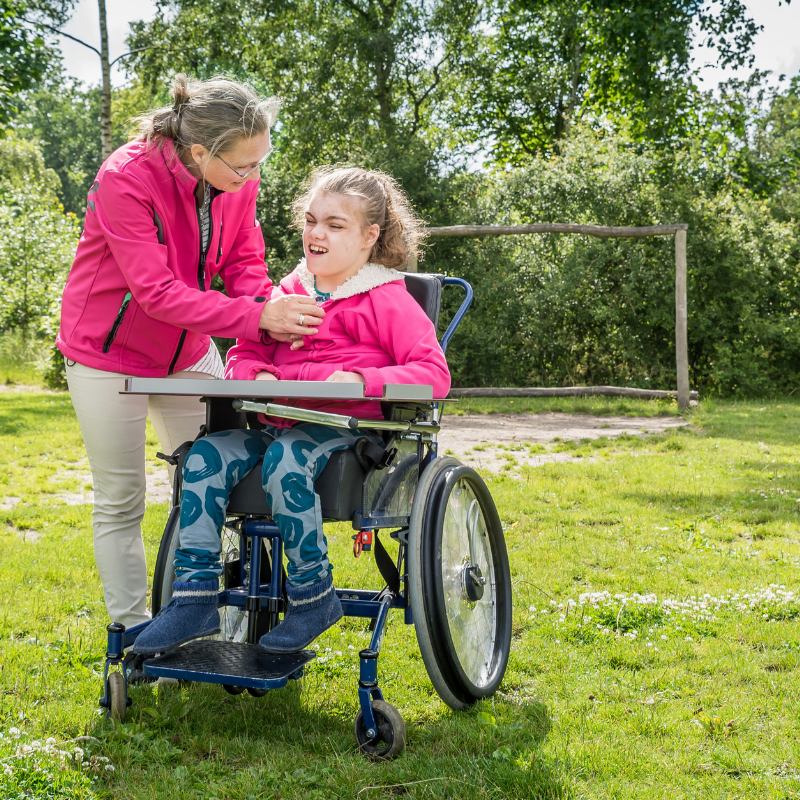How to make your child focus on studies
10 Tips to Increase a Child's Concentration
Can your kid focus his or her attention on tasks, chores or studies?
For most kids, it is difficult to focus for more than a few moments on any task, and that’s quite natural, due to their curiosity, exuberance and energy.
Concentration and focus are essential for studying, for homework and for the completion of any task.
Grown up people can improve their concentration with special exercises, however, with children, one needs to use different strategies.
You can help your child increase his or her concentration in various ways. You can teach your child certain habits and rules, which would make it easier to focus and become less restless. This would help with preparing homework or carrying out tasks.
I would like to offer here 10 tips to help your child focus better.
1. Reducing Distractions
Unless engaged in something they really like, children might find it difficult to screen out distractions.
You need to keep the environment where they learn, study or carry out tasks, as distraction-free as possible.
Be especially wary of television, loud music, noises, and anything else that might distract the child’s attention.
2. Television and Cell Phones
It is not a good idea to watch TV while doing homework, since this distracts the attention. Text messages and the social media also interrupt the concentration. Encourage and teach your child not to read text messages or use cell phones, while studying and doing homework.
3. Doing Homework at the Same Hour Every Day
Please Share This Post.
Repeating the same activity every day at the same hour, eventually, turns it into a habit.
If a child sits down for homework every day at the same hour, after a while, when the hour comes, there will be less effort required to focus. The mind will know that the time for homework has arrived, and would be more willing to study.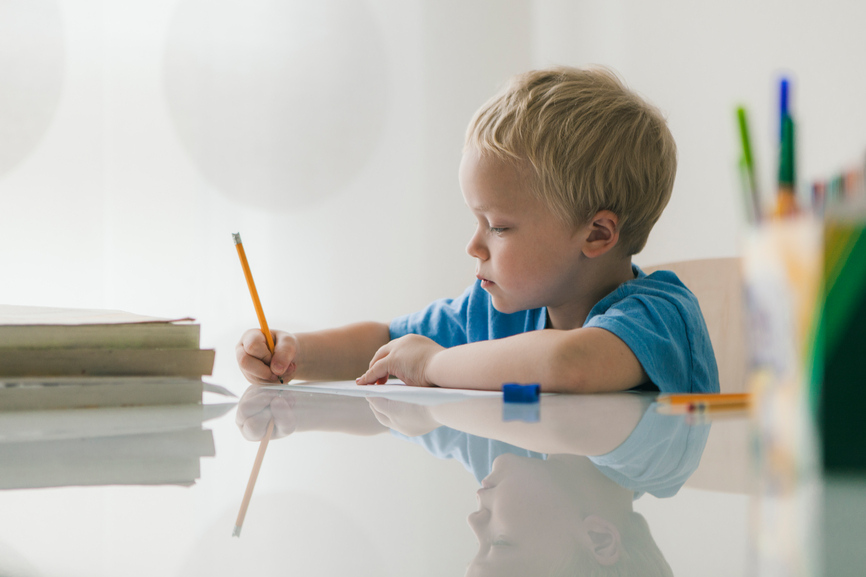
4. Give Them Enough Physical Activity
Some physical activity, like playing, running or some sports, between study and tasks, would supply a way to vent out extra energy.
This would help the child to be less restless, offset boredom, and make it easier focus.
5. Let Children Have Play and Fun
Giving children too many tasks and involving them in too many activities can be overwhelming and tiring for their brains.
As a parent, you should allow them enough time for pleasure and fun, so they don’t feel too pressurized.
6. Enough Rest
Ensure that the child gets enough sleep at night, and also, some rest during the day.
7. Set Time for the Completion of a Goal
Set the time for completing a goal. This could be ten minutes, twenty minutes, etc. This can force the kid to focus, so as to finish the goal within the time limits.
However, you should be careful with this, since some children might find setting time limits too pressurizing, and this could cause them anxiety and disturb their focus.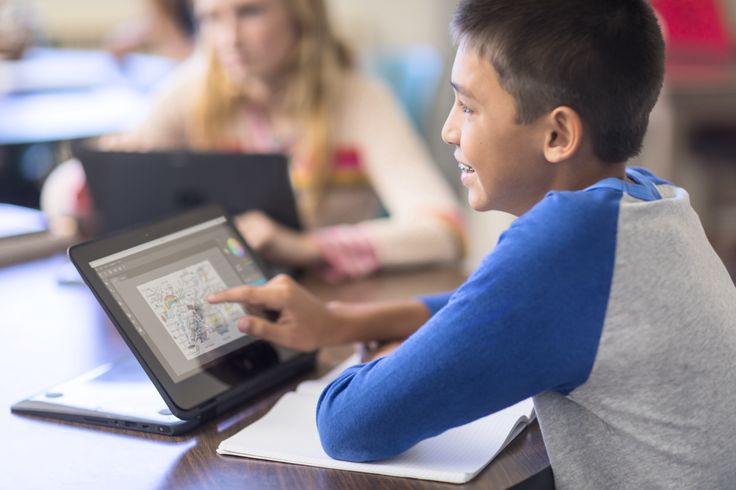
8. Let Them Play Games that Require Focus
You can train and strengthen a child’s ability to focus by playing games that require thinking. There are a lot of such games, which you can find in stores selling games for children.
Playing games that require focusing, planning and the use of memory combine fun with concentration.
9. Allow Some Time before Beginning a New Task
When your child is busy, tell him what he has to do next, but allow a few minutes of rest, between finishing the task and starting the new one. This would prevent tension and inner resistance.
10. Divide a Big Task into Small Tasks
A big task requires too much concentration and discipline, so it would be a good idea to divide it into smaller tasks. This could be applied to homework, housework and learning new skills.
Carrying out small projects, which lead to the completion of a major project, makes the project less intimidating and easier to focus on, and it also bestows the feeling of progress and movement.
A big task that requires time, dedication and focus, might seem intimating and overwhelming, and can awaken reluctance and procrastination. A small task seems easier to carry through, and it creates less resistance.
Set a Personal Example
If you wish to help your child, you need to set a personal example.
You need to improve your own focus. Then, you will be in a better position to teach.
You can find all the instructions, guidance and exercises for strengthening this skill in our book about this topic.
More articles:
The Power of Concentration
Articles about Concentration and Mind Power
About the Author
My name is Remez Sasson. I am the author and creator of SuccessConsciousness.com, which I have been running since 2001. Join me on a fabulous journey to self improvement, happiness, success, positive lifestyle, conscious living and meditation, through my website, articles and books.
Follow on: Facebook Twitter Pinterest Instagram Linkedin
Thank you for reading! To support my website and work, please click on the button below! Thanks in advance!
Buy Me a Coffee
Please Share This Post.
6 Simple Ways to Improve Your Child’s Focus
Trouble focusing can be a long-term or short-term challenge. Either way, it makes learning hard. It also impacts everyday life.
You can’t always change the circumstances that make it hard to focus. But there are ways to help your child cut through distractions and get things done.
If staying focused is hard for your child, try these six strategies.
1. Jump right into projects.
The longer you put off starting a task, the harder it can be to focus on it. That goes for projects for school and around the house.
That doesn’t mean your child has to do everything at once, though. To make it easier to get started, try breaking tasks into chunks. The important thing is to not delay getting started.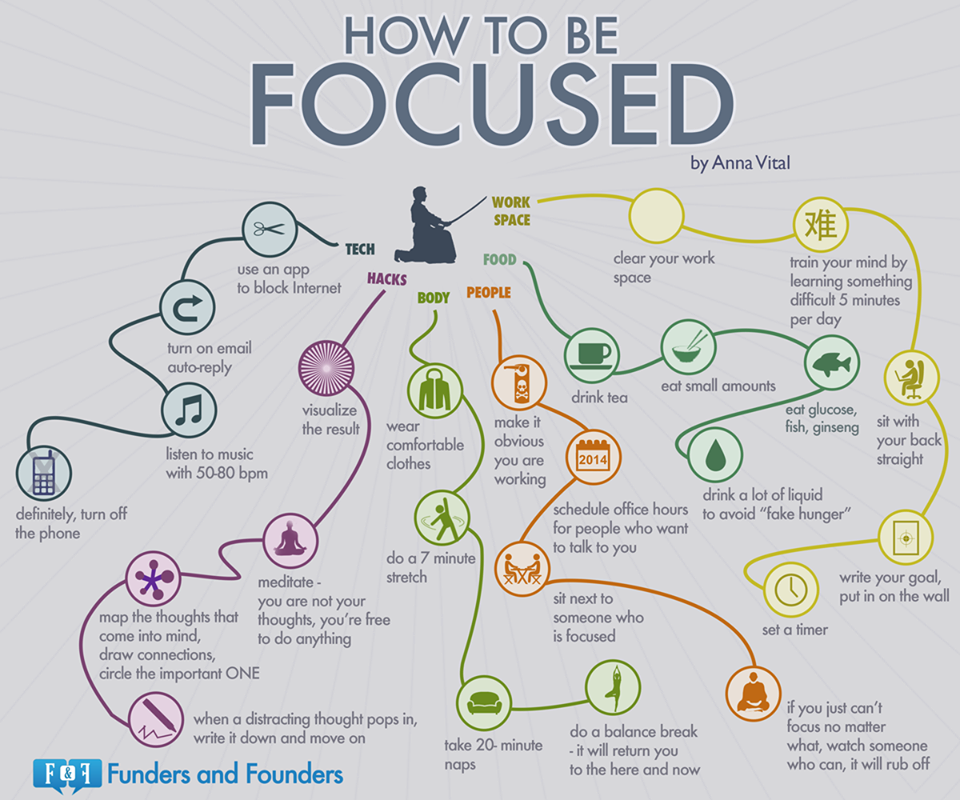
2. Limit directions to one or two at a time.
When kids struggle with focus, it can be hard for them to listen to, remember, and follow through on directions. So try not to overload your child with too many directions at once.
Let’s say it’s time for homework. You might tell your child to check the assignment book, get out the right materials, and start working. If that’s too much for your child to focus on and keep in mind, break it down into single steps.
3. Set a timer.
Knowing there’s a limit to how long they have to stay focused can make it easier for kids to hang in there. Set a timer for how long your child needs to work before having a quick snack or taking a break. You can increase the amount of time little by little as your child gets better at focusing.
4. Try mindfulness.
Mindfulness exercises are all about paying attention and focusing. Studies have shown that mindfulness can help kids improve their behavior and their ability to focus on lessons and on schoolwork.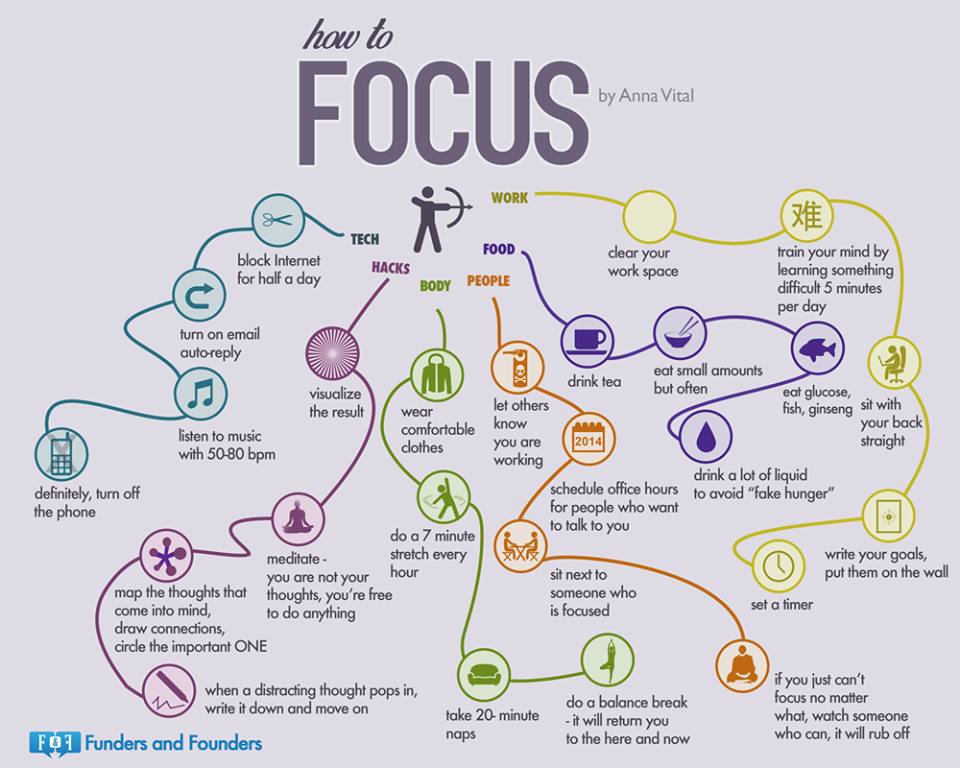
One way to practice is to sit quietly and focus on breathing in and out. Taking even a few deep breaths before class or a test could make a difference.
5. Be open to what works.
Some people need total quiet to focus. Others do better with noise. That’s why it’s important to ask kids what works best for them.
Maybe your child wants to listen to music while doing homework. Give it a try and see how it goes.
6. Direct focus back to the task.
Even when using these focus techniques, kids might still get distracted. That’s why they also need strategies to get back on task once they’ve drifted.
Come up with a signal for when your child’s mind starts to wander. It might be putting a hand on your child’s shoulder or saying a specific word. Tell your child’s teacher you’re trying these strategies at home.
Other ways to help your child focus
There are lots of other strategies, techniques, and low-cost tools you can use to help your child with focus at home.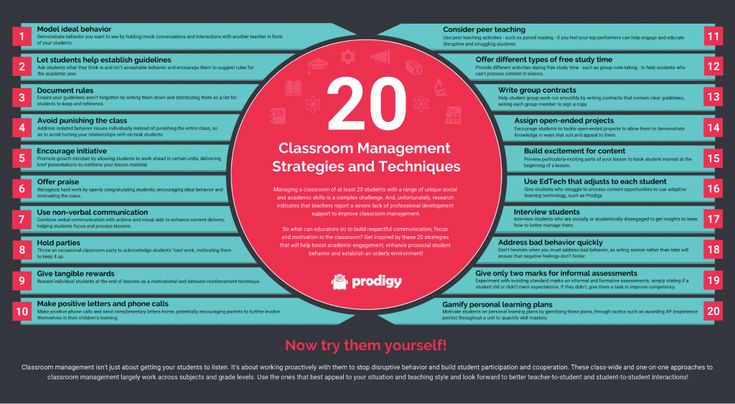
- Discover different types of fidgets, including ones you can make.
- Try free graphic organizers to help your child get through reading, writing, and math assignments.
- Learn ways to break down writing assignments so they’re easier to focus on.
Struggling with focus or any other skill can take a toll on a child’s self-esteem. Praise your child’s hard work to improve focus. Point out even small improvements. And let your child know that focus skills can get better.
And remember to talk about your child’s strengths, not just challenges. Celebrate focus wins, big and small. When kids understand what they’re good at, it builds confidence and helps them stay motivated when things get tough.
Related topics
Focus and attention
Strategies and tips
5 exercises to help your child concentrate - declifeschool
How to help your child concentrate: DEC life school psychologist Oksana Zaykina talks about five exercises that will help children concentrate on lessons or other useful work.
 Material for the portal uaua.info
Material for the portal uaua.info A child's ability to concentrate his attention on an object, phenomenon or task is a very important component of the development of his mindfulness and awareness in general. It is extremely important for the success of the child in learning and further development.
Oksana Zaykina
child psychologist, DEC life school
We have noticed that many students who come to our school, like many modern children of the digital age, need adult help in developing this skill. We have developed several exercises that help children concentrate before starting lessons, before working on their own homework and in other life situations.
We share with you five practices, the effectiveness of which we have seen from our personal experience of working with the students of our school.
Effective practices for concentrating a child's attention
The Minute of Silence practice
This is one of the most effective practices for concentrating a child's attention. We recommend doing it as a ritual at school, before starting any learning activity and at home, before doing homework and at bedtime. When your child masters it, he will always be able to tune in on his own in any life situation.
We recommend doing it as a ritual at school, before starting any learning activity and at home, before doing homework and at bedtime. When your child masters it, he will always be able to tune in on his own in any life situation.
So, invite the child not to speak for a minute after he has sat comfortably and relaxed. During this minute, it is important for the child to focus his gaze on a specific visual object: on an hourglass, on a candle flame, or on a bottle of liquid and sparkles settling in it (a souvenir ball with cereal).
We use just such “bottles” and “balloons” at school, because we can additionally give the child such an important message: THEY CALM AND SET, THROUGH THE GLASS WE CAN SEE WHAT IS HAPPENING AROUND. ALSO THE CHILD CAN FOCUS ON THE DIAL OF THE CLOCK, DESK OR WALL.
In addition to developing the ability to concentrate, he learns to feel the time, begins to understand the speed of its flow. Some older children are more comfortable sitting with their eyes closed during this practice.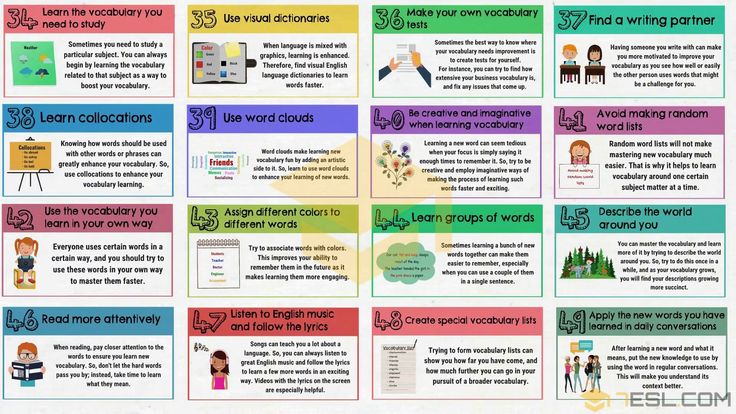 We offer them to concentrate on their inner feelings. The easiest way to teach a child this variation of the “moment of silence” is by inviting him to focus on his breathing.
We offer them to concentrate on their inner feelings. The easiest way to teach a child this variation of the “moment of silence” is by inviting him to focus on his breathing.
Although the practice is called “A Minute of Silence”, it can also be done for 2-3 minutes.
Top Clap Practice
Parents can help their child get ready for class or homework with this simple play practice. Ask the child to stomp if the phrase you say is absurd or untrue, and clap if it matches reality, is true.
For example, you say: “Mushrooms grow on a birch” or “It always snows in summer” and the child stomps. And when you say: “Cucumbers grow in the garden” or “Ice cream tastes sweet and cold,” he claps.
Five or six questions are enough for a child to understand the rules of the “game”. Another 15-20 questions within the framework of this exercise are enough to “turn on” the child and set him up for more routine activities that require concentration.
"Look Around" Practice
Ask the child to look around the room or classroom and name as many objects as possible that have a particular attribute - either by color or shape. This practice not only works to quickly mobilize concentration, but also expands his attention span.
For example, a seven-year-old child should be able to simultaneously hold 3-7 objects in his field of attention - this is a good "volume". A more advanced variation of this practice is Mindful Walking. They also not only develop concentration, but also the amount of attention in children.
While walking along your usual route, invite your child to notice something that he and you did not notice before. Tell him that you will walk for five minutes, trying to memorize as much as possible around, and then compare your results.
Or so: you will walk for one minute in complete silence, notice all the sounds and visual objects along the way, and then compare your “findings”.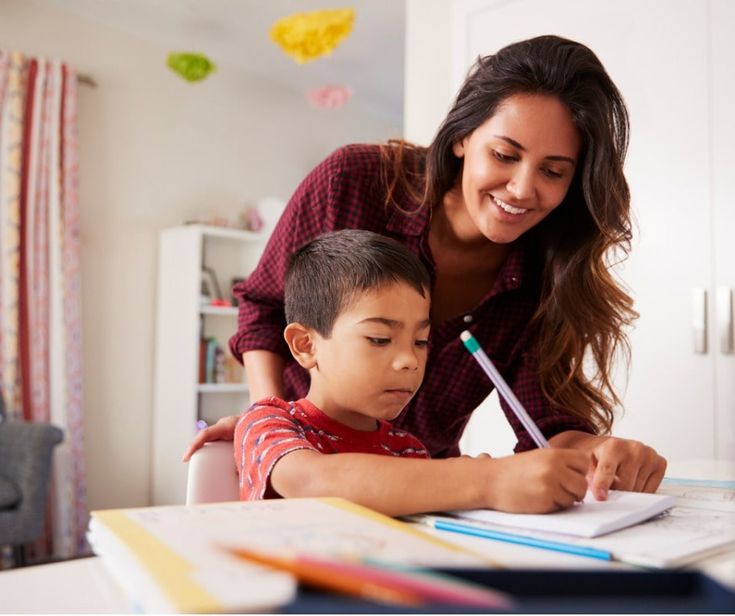 The game element will always interest the child more: tell him that he is a "spiderman" and his eyesight, smell and hearing are as sharp as those of his favorite superhero. This will motivate him to play practice better.
The game element will always interest the child more: tell him that he is a "spiderman" and his eyesight, smell and hearing are as sharp as those of his favorite superhero. This will motivate him to play practice better.
Practice “Listen carefully”
You read a passage of text aloud to a child and ask him to silently count and say how many words he heard that began, for example, with the sound “M”.
Do Not Go Wrong Practice
Ask the child to count to 30, and don't name numbers that contain "3" or end with "5". This is an excellent and simple practice for concentration before starting a learning activity.
It is very important for parents to understand that when a child's emotions are out of balance, his ability to concentrate and mindfulness falls automatically. Therefore, we use in our practice and recommend to parents such simple tricks as playing with water or loose objects.
Invite the child to pour water into different containers or pour cereals, mix cereals or beads of different shapes and colors, and ask the child to sort them out.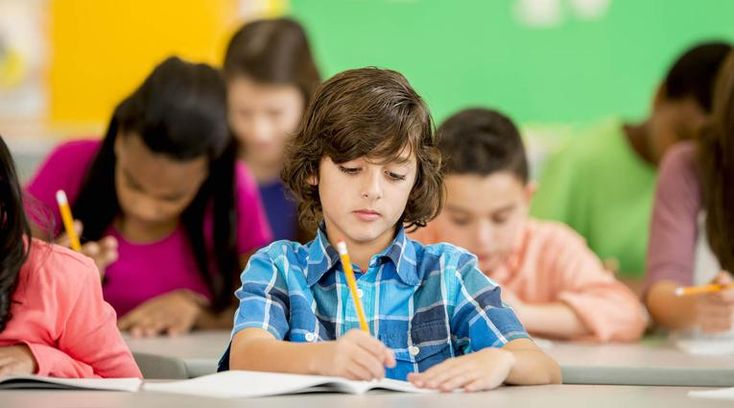 These simple games are very calming in children's emotional state and restore their ability to concentrate. They work most effectively for children aged 3-8 years.
These simple games are very calming in children's emotional state and restore their ability to concentrate. They work most effectively for children aged 3-8 years.
All breathing practices improve concentration, attention and, as a result, learning success in children - we really see this in our practice at school. To help children keep their emotional background in balance, we offer them the "Breathing with a Buddy" technique.
The child lies on the floor, we put his favorite toy on his stomach and ask the child to just breathe and watch how his friend rises and falls smoothly.
We also sometimes offer children “Musical Journeys”: for 30 seconds with the child, with eyes closed, we listen to recordings of pleasant melodic sounds (bell or singing bowl) and ask him to track his feelings in the body - goosebumps ran on the skin, tingling in toes, etc.
WE HAVE NOTICED THAT THIS PRACTICE CHILDREN SOMETIMES MAY COMPLAINT ABOUT SOUND DISCOMFORT, BUT IT DEVELOPS SUCH ADDITIONAL ASPECTS OF ATTENTION SUCH AS PATIENCE AND PERSPECTIVITY.
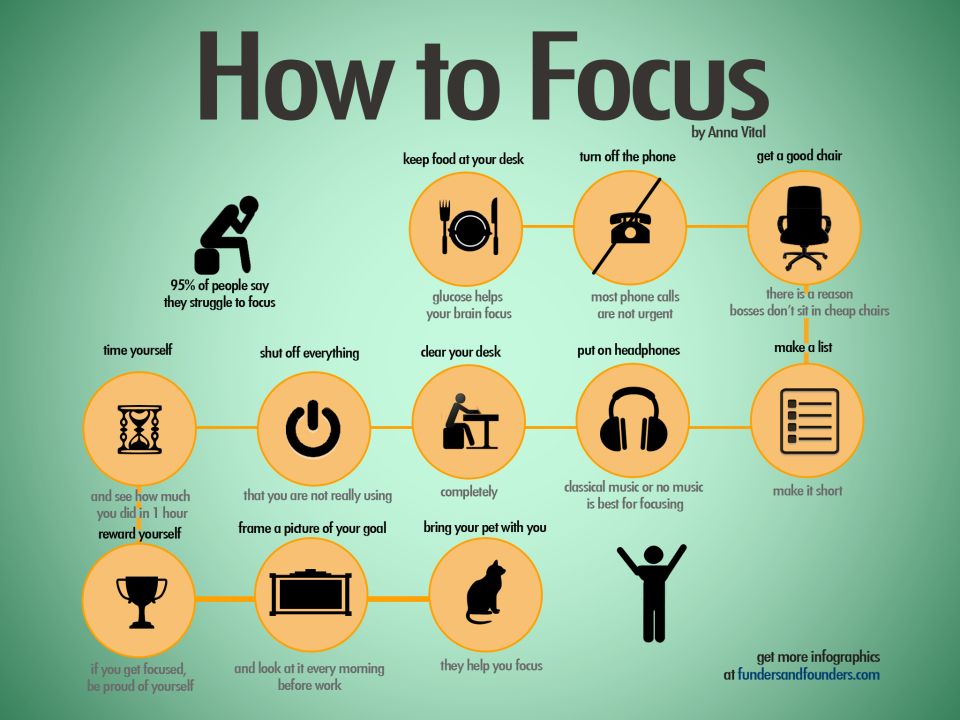
In conclusion, I would like to remind you of three universal simple home “simulators” for developing concentration and attention in a child. This is a joint cooking (let the little ones help you wash the vegetables, and the older children, for example, cut them).
The second is help around the house, which requires a certain concentration and accuracy (the best option is to ask the child to rub the leaves of a flower in a flowerpot).
And the third is modeling (everything: from dough to clay). It perfectly helps to develop concentration and attentiveness not only for babies, but also for teenage children.
Now you know the most effective practices to help your child concentrate.
Source: www.uaua.info
How to focus on learning for a child
Date: January 23, 2014 Author: Alina Category: For preschoolers 0
Many parents say that their children can hardly concentrate on one subject. In such cases, psychologists and educators are advised to take immediate action. The inability to concentrate attention entails a lag in subjects at school. If a child cannot concentrate, then it is difficult for him to learn new concepts. This is a big hindrance to development. Expert advice will help you overcome the problem.
The inability to concentrate attention entails a lag in subjects at school. If a child cannot concentrate, then it is difficult for him to learn new concepts. This is a big hindrance to development. Expert advice will help you overcome the problem.
The ability to concentrate - what is it
This concept implies a long-term concentration of attention on a certain object. Intentional concentration is a difficult task that even adults sometimes cannot cope with. As for children, it is even more difficult for them to fully concentrate on one subject. However, this quality is simply necessary for successful learning, so it must be developed.
If your child is 5 years old, he should be able to fix his attention on an object for about 8 minutes. Some children at this age are able to concentrate for 20 minutes. To find out this indicator for an older child, you need to multiply each year by 5 minutes. But much depends on the specific situation and on the characteristics of the character of the child.
Factors that affect the ability to concentrate:
• great interest in the subject;
• the presence of interference;
• time of day;
If the child is not interested, then his attention will "jump" from one object to another. This leads to learning delays and wasted time. Any student would rather watch an interesting TV show than read a boring textbook.
Main causes of lack of concentration
1. Watching your child, you can be sure that in the process of doing an interesting thing, he concentrates his attention for quite a long time. Carried away, children forget about lunch, a walk and other things. However, when it comes to routine lessons, they cannot concentrate. This is the main reason for the lack of attention. If a child does not see any benefit for himself in a certain activity, then he has no incentives. In this case, parents need to create these incentives. Analyze the situation and come up with a good reason that can "spur" children's interest.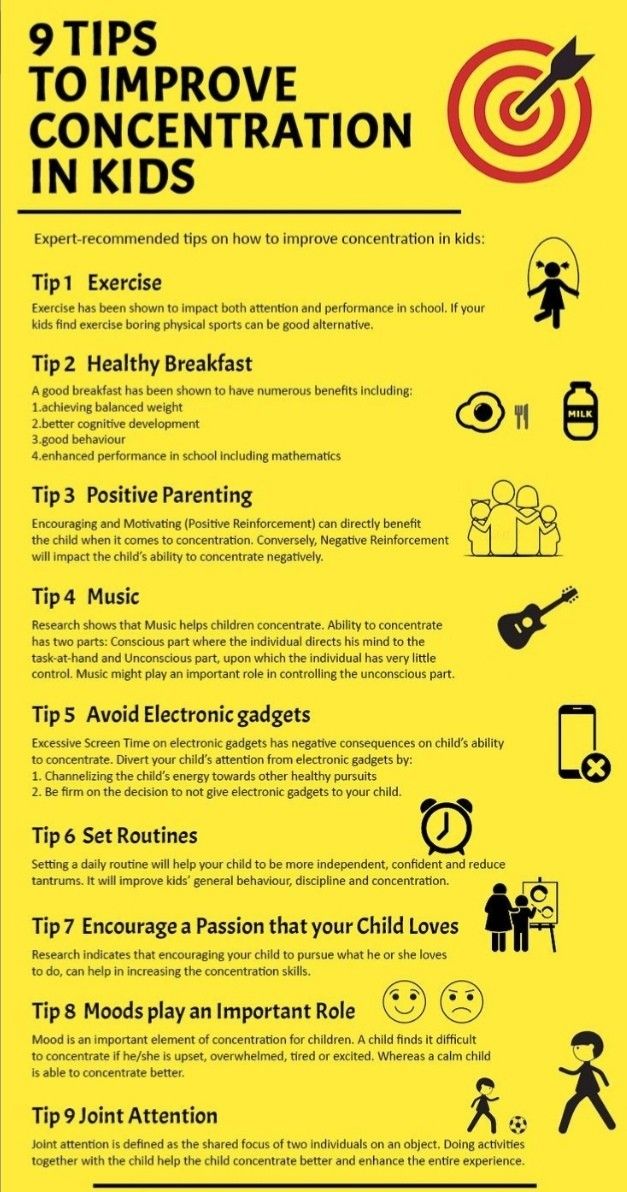 If the child is still small, then it is better to turn any training into an exciting game. Then he himself will not notice that the lesson has become interesting for him. When teaching a child to read and write, you can write letters not in a notebook, but on asphalt or on a blackboard. Letters can be sculpted from adze or plasticine, drawn with crayons, paints, etc. Small children are not attracted to copybooks. But they are immediately addicted to writing letters during games and walks.
If the child is still small, then it is better to turn any training into an exciting game. Then he himself will not notice that the lesson has become interesting for him. When teaching a child to read and write, you can write letters not in a notebook, but on asphalt or on a blackboard. Letters can be sculpted from adze or plasticine, drawn with crayons, paints, etc. Small children are not attracted to copybooks. But they are immediately addicted to writing letters during games and walks.
2. If the child is not feeling well, he will not be able to concentrate on the lesson. As a result of fatigue, physical ailment or overwork, performance is significantly reduced. Therefore, an important task of parents is to create an optimal training schedule. The child should not be overloaded. If you notice that the baby is tired, he needs to take a break. Studying at home, you need to pause for 10 minutes between classes. Let the child do physical exercises at this time. However, too much activity leads to the fact that children calm down for a long time after a pause.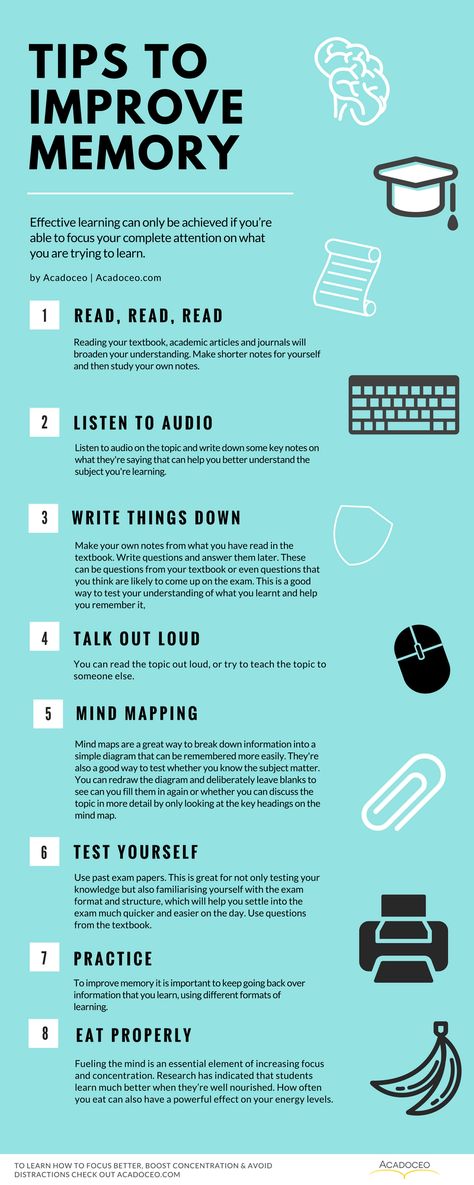 This, too, must be avoided.
This, too, must be avoided.
3. If a child is upset about something, he will not be able to do it either. An offended or upset person constantly scrolls the situation in his head. A heart-to-heart conversation will help to get rid of the negativity. Help the child to throw out the accumulated resentment or irritation. Only then will he come to his senses and be ready for concentration. Very often, small children cannot study when they are waiting for some pleasant events. If you promised to take him to a circus or a zoo, he probably fantasizes. In this case, psychologists advise to play the scene. Let him present what he wants and tell you about it. This will help the child to express emotions. Then he will be ready for productive activities.
4. The absence of external irritating factors is an important condition. If the baby sat down to do homework, then exclude all the moments that may interfere with him. TV and radio must be turned off. Toys should be placed in their places.

